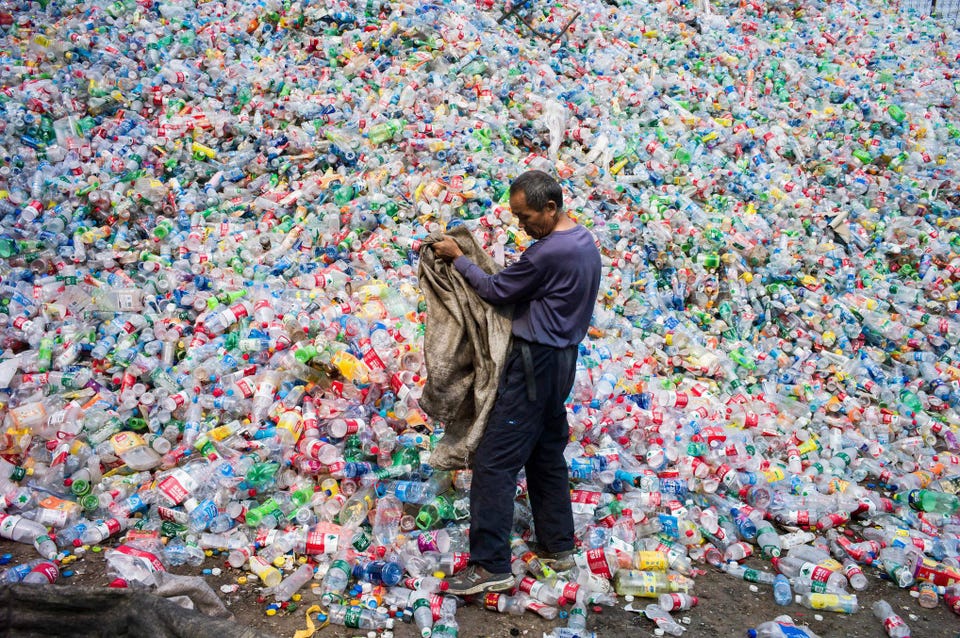Sustainability Could This Breakthrough Make Plastic Production Truly Circular? Jamie Hailstone Contributor Opinions expressed by Forbes Contributors are their own. I write about air quality and the environment. New! Follow this author to stay notified about their latest stories.
Got it! Aug 16, 2022, 04:08am EDT | New! Click on the conversation bubble to join the conversation Got it! Share to Facebook Share to Twitter Share to Linkedin TOPSHOT – This photo taken on September 17, 2015 shows a Chinese labourer sorting out plastic . . .
[+] bottles for recycling in Dong Xiao Kou village, on the outskirt of Beijing. China is the world’s biggest emitter of the greenhouse gases that cause climate change, and a crucial player in the global gathering finishing on December 11 in Paris, where nations have been trying to thrash out a plan to limit dangerous global warming. The 195-nation UN climate rescue talks in the French capital have been billed as the last chance to avert worst-case-scenario climate change impacts: increasingly severe drought, floods and storms, as well as island-engulfing rising seas.
AFP PHOTO / FRED DUFOUR (Photo by FRED DUFOUR / AFP) (Photo by FRED DUFOUR/AFP via Getty Images) AFP via Getty Images The issue of how we (as a planet) deal with plastic is one of the greatest challenges the world currently faces. A report published earlier this year by the WWF highlighted the scale of the problem and noted that only 9% of all the plastic waste ever produced has ever been recycled . Aside from the sheer amount of plastic being produced all over the globe, there have been major issues around the processes available to recycle waste plastic.
And one of the biggest stumbling blocks has been the number of times that plastic can be recycled. Depending on the type of plastic, it can range from once to a finite number of times. Furthermore, recycled plastic cannot be used in food packaging and pharma applications.
But now experts in Finland have developed a new process, which they claim could convert most of the world’s waste plastics back to usable virgin grade materials an infinite number of times. The process has been developed by the VTT Technical Research Centre of Finland, which plans to spin out a new company – Olefy Technologies – where the patent-pending technology will be able to extract over 70% virgin grade plastics and chemical raw materials components from plastic waste. “Olefy is a quantum leap in recycling that will change the way the world views plastic by making it truly circular and guiding us towards carbon neutrality even faster,” said Antti Vasara, CEO of VTT.
MORE FOR YOU Is Carbon Capture Another Fossil Fuel Industry Con? Sustainable Fashion Wants Brands To Redefine Business Growth Trouble With Predicting Future Of Transportation Is That Today Gets In The Way The new process is based around gasification, which turns solid fuel into gas. Matti Nieminen, head of technology at Olefy Technologies, said in the new process, plastic waste and steam are heated up rapidly to reaction temperature, but only for a very short time. In tightly controlled conditions, the plastic waste then breaks down, step by step into smaller chemical components.
“One specific characteristic feature of the Olefy process is that this breakdown of plastic waste is stopped exactly when plastic waste has broken down to olefin molecules, but not yet to lighter molecules, like methane,” said Nieminen. “The Olefy process turns plastic waste to olefins and other recycled industrial chemicals in one single step. Thanks to this, the amount of targeted olefins and other recycled chemicals is significantly higher than in multi-step processes.
” He added in “favourable conditions”, the new process can turn more than 70% of plastic waste feed to olefins and other valuable recycled hydrocarbons, which is significantly more than any other known thermal plastic recycling technology can do. He said it is also capable of recycling plastic waste containing some aluminium foil, which is normally very difficult to utilise. “The Olefy process can be used for recycling of plastic waste again and again because the molecular structure of plastic is returned back to virgin grade quality every time.
This makes Olefy as a real enabler of the circular economy of plastics,” he added. “The economic benefits of having virgin grade components from recycled materials can completely change the dynamic of global oil consumption. Olefy will significantly reduce the need to use new oil for making plastic and maybe even create a new economic incentive to clean up plastic from land and water as it becomes a valued commodity,” concluded Nieminen.
The working Olefy pilot is successfully running at VTT Bioruukki Pilot Centre in Espoo, Finland. The company is currently discussing partnerships and negotiating with investors for scaling, business development, and licensing of the technology. The first industrial demonstration operation is expected to be operational by 2026.
Olefy’s technology has been developed as part of VTT LaunchPad , a science-based incubator, where VTT researchers and technology are brought together with business expertise and investors to renew industries. VTT LaunchPad supports incubator teams to develop VTT-owned IPR into fundable spin-off companies Follow me on Twitter or LinkedIn . Check out some of my other work here .
Jamie Hailstone Editorial Standards Print Reprints & Permissions.
From: forbes
URL: https://www.forbes.com/sites/jamiehailstone/2022/08/16/could-this-breakthrough-make-plastic-production-truly-circular/
